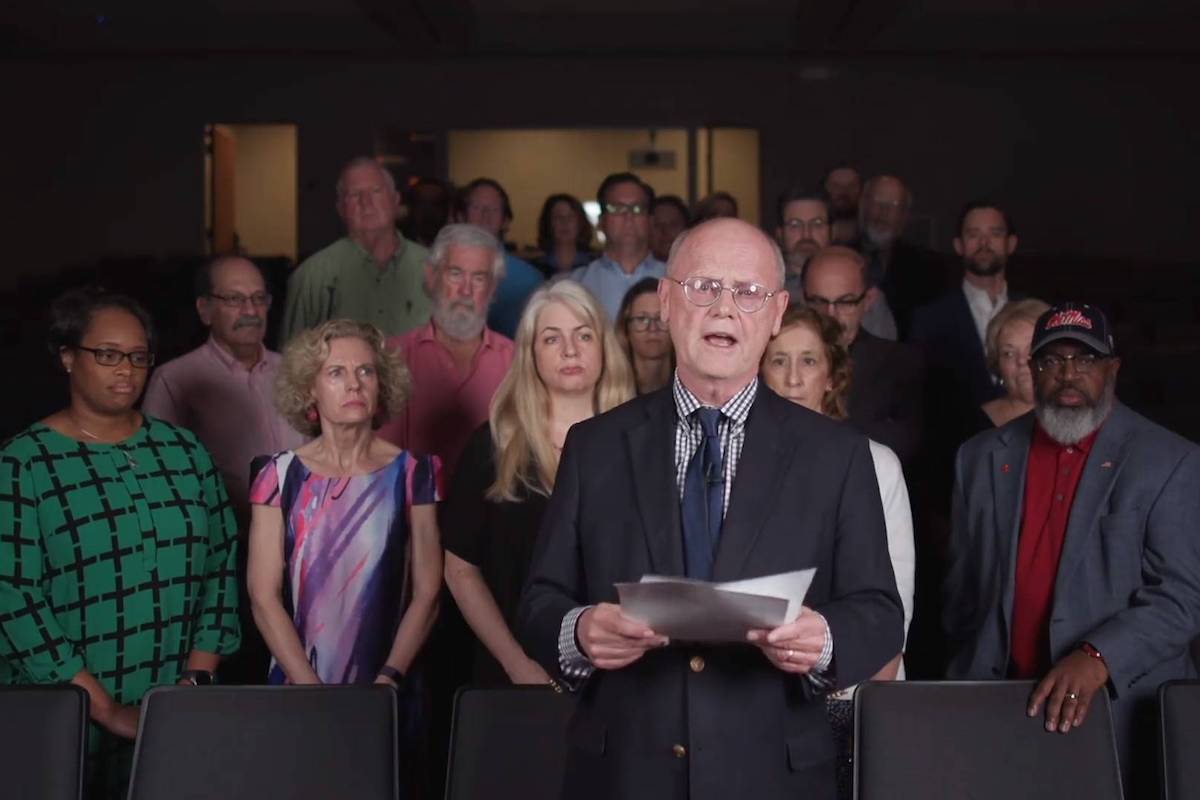University of Mississippi officials have launched an investigation into a group of anonymous whistleblowers who earlier this year sounded the alarm about dozens of secret emails that showed how school officials privately coddled racist and sexist sentiments to woo wealthy donors.
Some faculty and officials at the school are now accusing the whistleblowers, known collectively as Ole Miss Information, of creating “a hostile work environment.”
Another anonymous group, Ole Miss Transparency, obtained thousands of emails through public-records requests and passed them onto Ole Miss Information, which then shared them with this publication in the spring and summer. The Mississippi Free Press broke the story with a three-part investigative report in August.
“You know Oxford and Ole Miss have real problems when black hookers are working on Jackson avenue. The African American visitors were competing for her affection,” read one September 2018 email that wealthy UM alumnus Blake Tartt, a Houston businessman, sent to then-journalism school Dean Will Norton. “It made me sick. … I happen to know what happens when a place is overtaken by the wrong elements.”
As he did in numerous other instances, Norton responded without criticizing the wealthy businessman who he hoped would give a sizable donation to the school.
“Blake, I have been really disappointed for a long time with the way this culture is going,” the journalism dean wrote back the next morning.
Norton Continues to Receive Large Salary
Norton announced that he was resigning from his position as dean in April after Ole Miss Transparency first made its public-records request in March. In emails to other UM officials at the time, Norton expressed hope that his resignation would prevent the emails from becoming public.
Even as UM school officials investigate the whistleblowers who brought those emails to this publication’s attention, Norton remains a paid member of the faculty.
The Mississippi Free Press requested documents from the Mississippi Institutions of Higher Learning showing that Norton, who has not worked at the university or taught classes since he resigned as dean in May, continued to receive a $18,739 monthly salary in June. The June payroll document listed him as a “Professor of Journalism and New Media.”
Norton did not teach classes over the summer and is not teaching classes during the current fall semester.
A September budget projection document lists Norton as continuing to receive $65,378.59 in yearly “fringes” since stepping down as dean, with his administrative supplement intact. The school is spending about $80,000 less than it currently pays Norton on its salary for interim journalism dean Deb Wenger, who took over when Norton stepped down in May, the document shows.
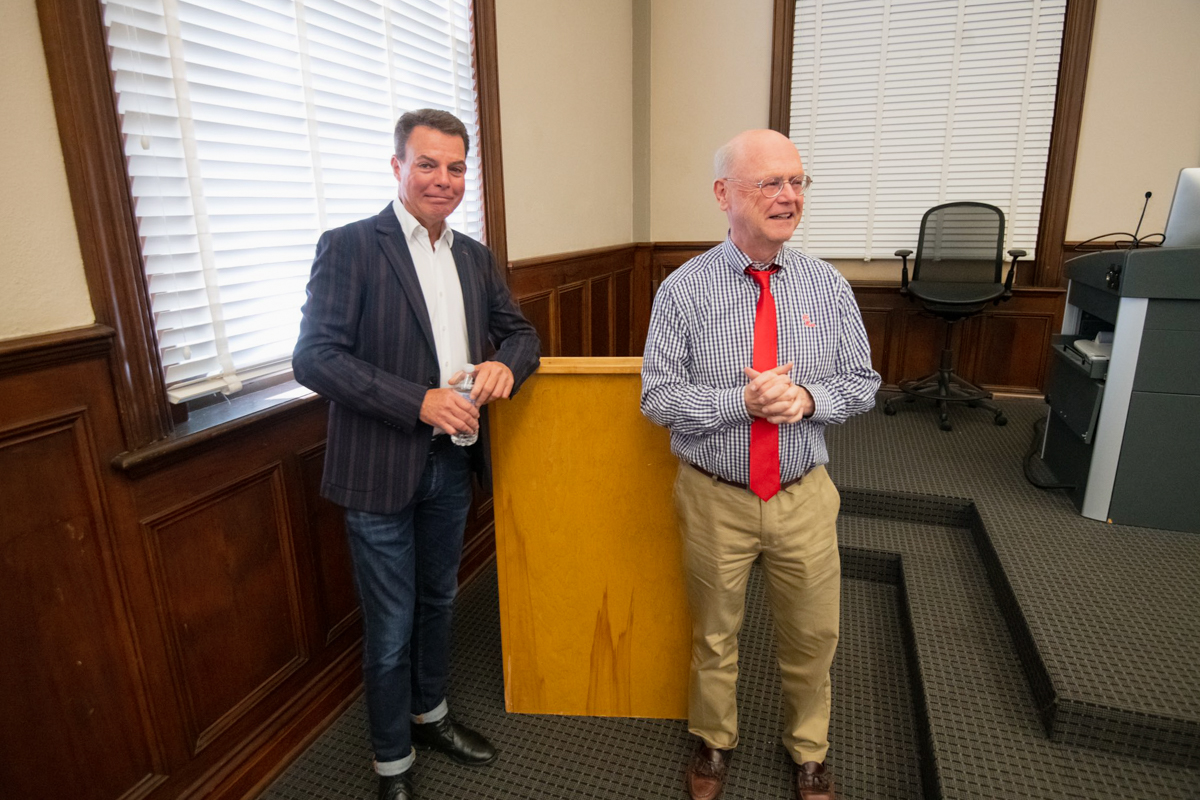
After the whistleblowers obtained the trove of emails earlier this year, they shared the Norton-Tartt emails with a number of journalism-school faculty members and UM administrators in the spring, raising concerns about their contents.
They also shared emails with faculty members in which Norton made disparaging comments about the sexuality of Shepard Smith, who is gay and attended the UM journalism school before working for Fox News and now CNBC.
The controversial Norton emails stayed quiet, even after the whistleblowers emailed them to a number of faculty members and administrators at UM, urging them to take action.
When the Mississippi Free Press was working on the initial series of stories in the spring and summer, multiple sources who asked for their names to be kept private described a “culture of fear.” They claimed that the journalism school had launched a “witch hunt” to root out whistleblowers in the past.
In recent months, the Ole Miss Information whistleblowers have also sent emails to faculty and administrators at the school raising concerns about the propriety of Norton continuing to receive an administrative bonus now that he is no longer a dean.
Provost Wilkin Says University Not Violating IHL Rules
Though the school is accusing the whistleblowers of targeting faculty for harassment with anonymous critical emails, the Mississippi Free Press obtained a copy of an emailed complaint that one Ole Miss Information whistleblower sent to IHL Commissioner Van Gillespie on Sept. 21, 2020. The whistleblower also sent the complaint to the Office of the Mississippi State Auditor.
“Despite being chased from his job in disgrace, when (UM Provost and Executive Vice Chancellor for Academic Affairs Noel Wilkin) calculated Dr. Norton’s salary as a nonadministrator faculty member, he allowed Dr. Norton to retain his ‘additional salary’ adjusted from 12 months to 9 months,” the whistleblower, whose pseudonym is Winston Smith, wrote. “This has resulted in Dr. Norton being paid more than twice the salary paid to any other 9 month full professor in journalism, over $200,000/year, to NOT perform any teaching duties.”
Smith, whose pseudonym is based on the protagonist of George Orwell’s utopian novel, “1984,” accused Wilkin of “making an improper gift of state taxpayer money to former administrators.”
The whistleblower cited the IHL Board of Trustees Policies & Bylaws Section 402.01 B, which says that “additional salary” for holding an administrative position “shall not be paid to the faculty member when he or she ceases to hold the administrative position.”
“For years, at the direction of the provost’s office, Ole Miss has violated this clear and unambiguous policy language,” Smith alleged in the complaint to IHL. “In the process, countless former administrators have been enriched with ‘additional salary’ well beyond the time they cease serving as administrators.”
The Mississippi Free Press obtained 10 years of IHL meeting minutes through a public-records request and also examined minutes from the months since Norton resigned. None of the minutes lists changes in Norton’s pay or status. There is no record of the IHL granting any special exceptions to its policies to Norton or any other UM faculty member.
Wilkin told the Mississippi Free Press that UM has “a policy about how department chair salaries are calculated when they move from faculty to administrative roles and when they return back to faculty” that “ensures consistency and compliance with IHL Board Policy 402.01 B.”
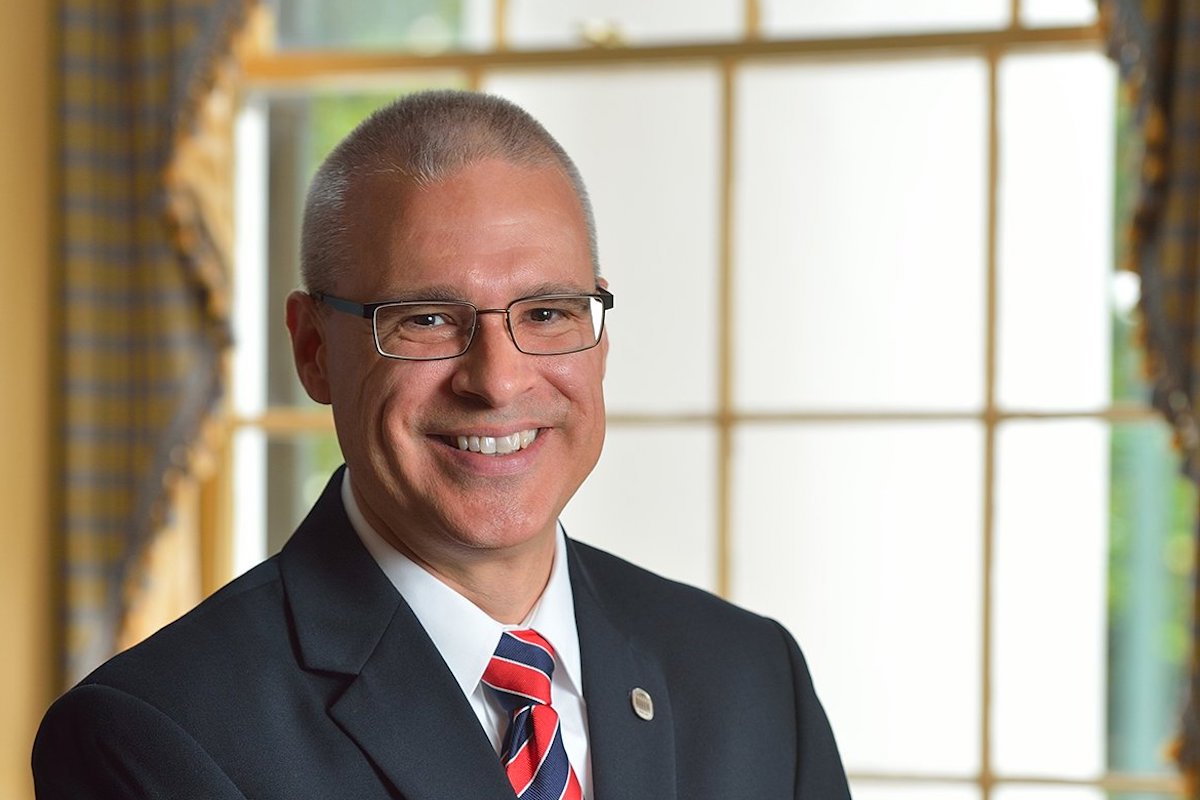
On Oct. 22, Wilkin told the Mississippi Free Press that the university policy that allows Norton to keep his pay has existed since at least 2005, predating his time as provost. That policy is not listed in any publicly available documents, but Wilkin sent a copy of it by email.
The policy the provost sent, though, refers only to “department chairs.”
“In most cases department chairs are provided salary increases for assuming chair positions. The amount is reduced if the department chair gives up the position,” the policy Wilkin sent reads. “In cases when a faculty member on a 9-month contract becomes a department chair with a 12-month contract, the 9-month salary is converted by the application of a plus two-ninths formula. The reverse procedure takes place if the faculty member gives up the chair position and returns to a 9-month contract.”
When the Mississippi Free Press pointed out that the policy only covers chairs, Wilkin said it was a matter of “consistent decisions.”
“In the absence of a policy for every administrative title or role, we have applied the approach outlined in the chair’s policy consistently with all administrative positions, in addition to the chairs,” he said. “Therefore, we have been principled in our approach and kept the decisions consistent with the departmental chair (administrator) policy and IHL policy.”
The Mississippi Free Press asked Wilkin which body created the policy at issue.
“According to the system, the policy has been loaded in the policy directory since the directory was created in 2005. As a result, it predates the policy directory that was populated in 2005 with existing policies. The original bodies that would have approved policies that predate the policy directories would be difficult to ascertain,” the provost said on Oct. 22.
‘Ongoing, Persistent, and Accusatory Emails’
The day after the Mississippi Free Press asked Wilkin about the policy on Oct. 22, he sent a letter to the UM School of Journalism and New Media faculty and staff, noting that faculty members had filed “a hostile work environment allegation against the individuals responsible for the anonymous communications.”
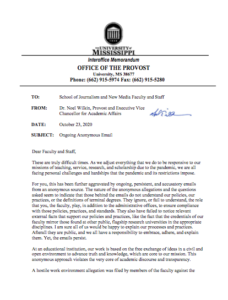
“It is my understanding that the Office of Equal Opportunity and Regulatory Compliance is conducting an investigation in response to your request,” Wilkin wrote.
In the Oct. 23 letter, Wilkin alluded to the fact that the whistleblower had also raised questions about whether administrators, including Norton in the journalism department, may have improperly hired professors or some given pre-existing faculty members promotions, including to tenure-track positions for which they did not qualify under IHL guidelines’ defined minimum standards.
“These are truly difficult times. … For you, this has been further aggravated by ongoing, persistent, and accusatory emails from an anonymous source,” Wilkin wrote to journalism faculty on Oct. 23. “The nature of the anonymous allegations and the questions asked seem to indicate that those behind the emails do not understand our policies, our practices, or the definitions of terminal degrees.”
It is not clear who the school suspects the whistleblowers may be.
Though Wilkin did not rebuff the specific allegations, he wrote that he was “sure all of us would be happy to explain our processes and practices.”
“After all, they are public, and we all have a responsibility to embrace, adhere, and explain them. Yet, the emails persist,” Wilkin wrote.
The provost told the Mississippi Free Press today that faculty credentials “are dependent upon the fields in which they are awarded and change over time.” In some cases, he said, master’s degrees can be considered terminal degrees.
Teach.com defines a “terminal degree” as one granting its recipient with “the highest level of education available in their chosen field.”
“The disciplines determine this in accordance with the changing standards in their fields nationwide, and search committees vet these credentials and experience upon hiring faculty,” Wilkin said. He said the practice “is consistent with the practice at major universities nationwide,” citing policies at the University of Missouri, the Columbia Graduate School of Journalism and Mississippi State University.
‘A Chilling Effect’
In Wilkin’s Oct. 23 letter to journalism faculty members, the provost said tenured faculty, with two members absent and one abstaining, had also “filed a grievance claim citing hostile working conditions” spurred by the whistleblower’s emails.
Those emails, Wilkin wrote to the journalism faculty, have “increasingly created a chilling effect on faculty speech, dampened faculty collegiality, interfered with teaching and scholarship, and caused several to express they feel they work in a hostile environment.”
Last year, before the whistleblower began contacting faculty members, a UM survey on the campus social climate revealed that about half of university faculty and staff had considered leaving the university in the past year.
Mississippi Free Press reporter Christian Middleton first reported on the climate survey results this month after receiving copies of the report from several sources, including Ole Miss Information. The whistleblowers obtained the report, which was not publicly available for download to non-students or employees, through a public-records request.
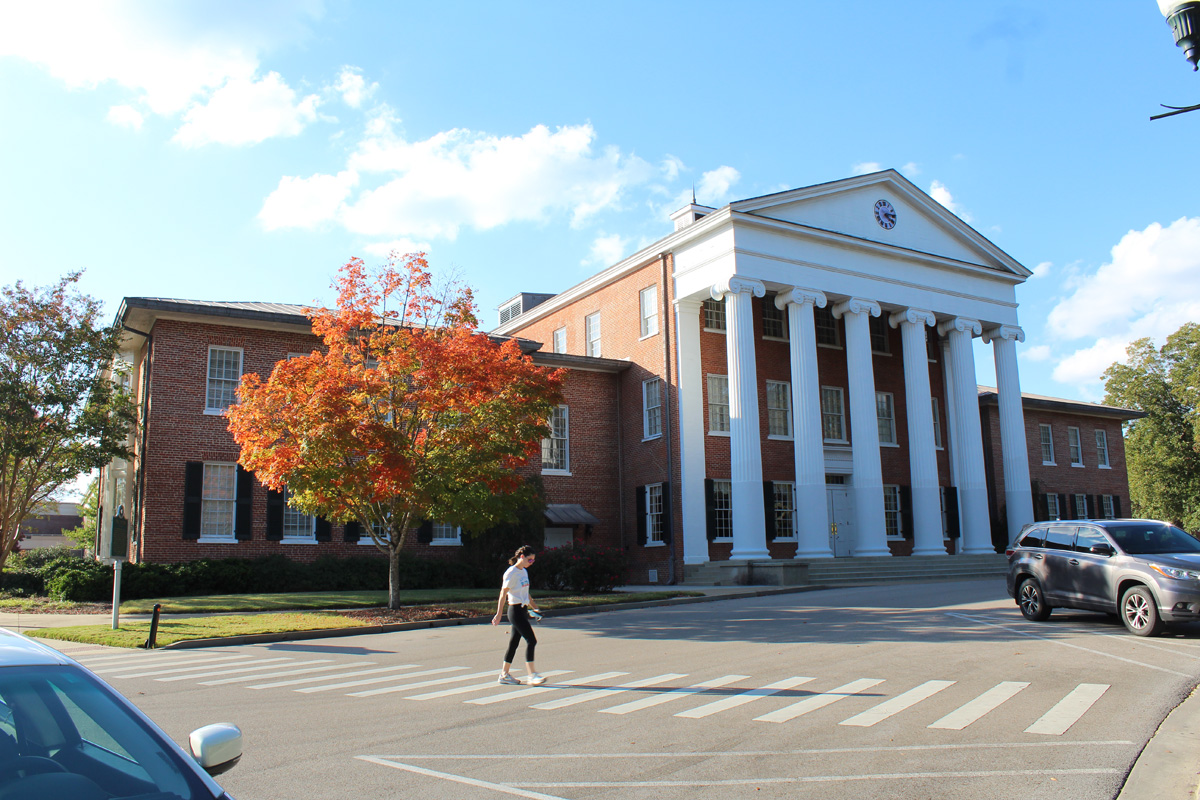
In Wilkin’s Oct. 23 letter to journalism faculty, he said he was looking at ways to address their concerns about the whistleblower.
“While the EORC investigation takes place, I am exploring mechanisms to give faculty some relief from this barrage of anonymous allegations in the workplace,” Wilkin wrote. “These efforts take time, and we appreciate the faculty’s patience and resolve while we do this work.”
Should the university take any action against any school employees over the EORC investigation, university policy says Wilkin would be the last line of appeal.
“The complainant or the person against whom the complaint is made … may appeal the findings of the investigation and any disciplinary action taken by submitting an appeal, in writing, to the Provost,” the policy says. “Such an appeal must be made within five (5) business days of the receipt of the notice of findings and recommendations from EORC. The Provost’s decision is final.”
Wilkin declined to discuss the investigations, saying only that he is “not able to comment on any possible investigations or personnel matters.”
Journalism Group Stripped Norton of Award
After the Mississippi Free Press first broke the story on the Norton emails in August, Wenger and Wilkin made several public statements vowing to improve the climate at the university, but neither directly mentioned Norton’s role in the story.
But another institution did deal with the three-part series’ revelations about the former journalism dean head-on. In September, the Columbia, S.C.-based Association for Education in Journalism and Mass Communication rescinded an award it had granted Norton in 2019.
“Recently published information resulting from a journalist’s FOIA request suggests that AEJMC’s 2019 Presidential Award designee Will Norton engaged in communication, including responding to highly questionable communication from a third party, that does not align with AEJMC’s Code of Ethics,” the organization said in a statement.
It cited belief in the values of fairness, sensitivity, compassion, diversity and “distributive justice in our relationships with peers, students, and other stakeholders.”
“In a duly called meeting, a quorum of the AEJMC Board of Directors met with some members of the Association of Schools of Journalism and Mass Communication (ASJMC) Board and, after discussion, the AEJMC board voted to rescind the award,” the statement said.
Former Dean Norton has not responded to multiple requests for comment, neither for this story nor for the UM emails series over the summer.
Editor’s Note: In the reporting of the UM emails series and follow-up reports, the MFP did not confer with members of either of our boards or any donors associated with the University of Mississippi to avoid conflicts of interest.
Also see: From Racist Emails to ‘Witch Hunts’: A UM Emails Timeline
Watch: Reporter Ashton Pittman and Editor Donna Ladd discuss the series during the 2021 Ancil Payne Award for Ethics in Journalism ceremony (40:00) and read more about the award here.
Read the full UM Emails reporting series to date:
- ‘The Fabric Is Torn In Oxford’: UM Officials Decried Racism Publicly, Coddled It Privately
- ‘The Ole Miss We Know’: Wealthy Alums Fight To Keep UM’s Past Alive
- UM’s ‘Culture Of Secrecy’: Dean Quit As Emails Disparaging To Gay Alum, Black Students Emerged
- ‘Appalling’: UM Provost Decries ‘Hurtful’ Emails About Black Women, Gay Alum
- Ole Miss’ Coddle Culture: Ole Miss Will Stay ‘Ole Miss’ Without Radical Shift
- EDITOR’S NOTE: The Decisions, Process, Motives Behind Ashton Pittman’s Series On UM Emails
- Perpetuating Patterns: It’s Time To Build A Better University Of Mississippi
- After UM Emails, Dean Plans ‘Anti-Racist’ Training, Donor Changes to ‘Remake Our School’
- ‘Ole Miss’ Vs. ‘New Miss’: Black Students, Faculty On How To Reject Racism, Step Forward Together
- UM Closely Guards Climate Survey Providing Window Into Social Issues, Sexual Violence
- UM Probes Whistleblowers Who Exposed Racist Emails As Ex-Dean Keeps $18,000 Monthly Salary
- ‘Our Last Refuge’: UM Faculty ‘Terrified’ As Officials Target Ombuds In Bid To Unmask Whistleblowers
- ‘Like He Was Disappeared’: UM Faculty Fear Retaliation After Ombudsman Put On Leave
- UM Appoints Acting Ombuds As Weary Faculty See Effort To ‘Stamp Out’ Anti-Racism Voices
- UM Retaliating Against Ombudsman for Protecting Visitors’ Privacy, Org Says
- UM Accuses Ombudsman of ‘Raising False Alarms’ Over Whistleblower Investigation
- A Matter Of Trust: UM Controversy Shows How Ombuds Programs Should, Shouldn’t Function, Expert Argues
- UM Pursuing ‘Criminal Investigation’ Into Whistleblowers Who Exposed Racist Emails
- Ombuds ‘Exonerated’ As UM Emails Whistleblower Hunt Fails to Identify Sources
- Will Norton, Ex-Dean in ‘UM Emails’ Race Saga, Quietly Departs University

